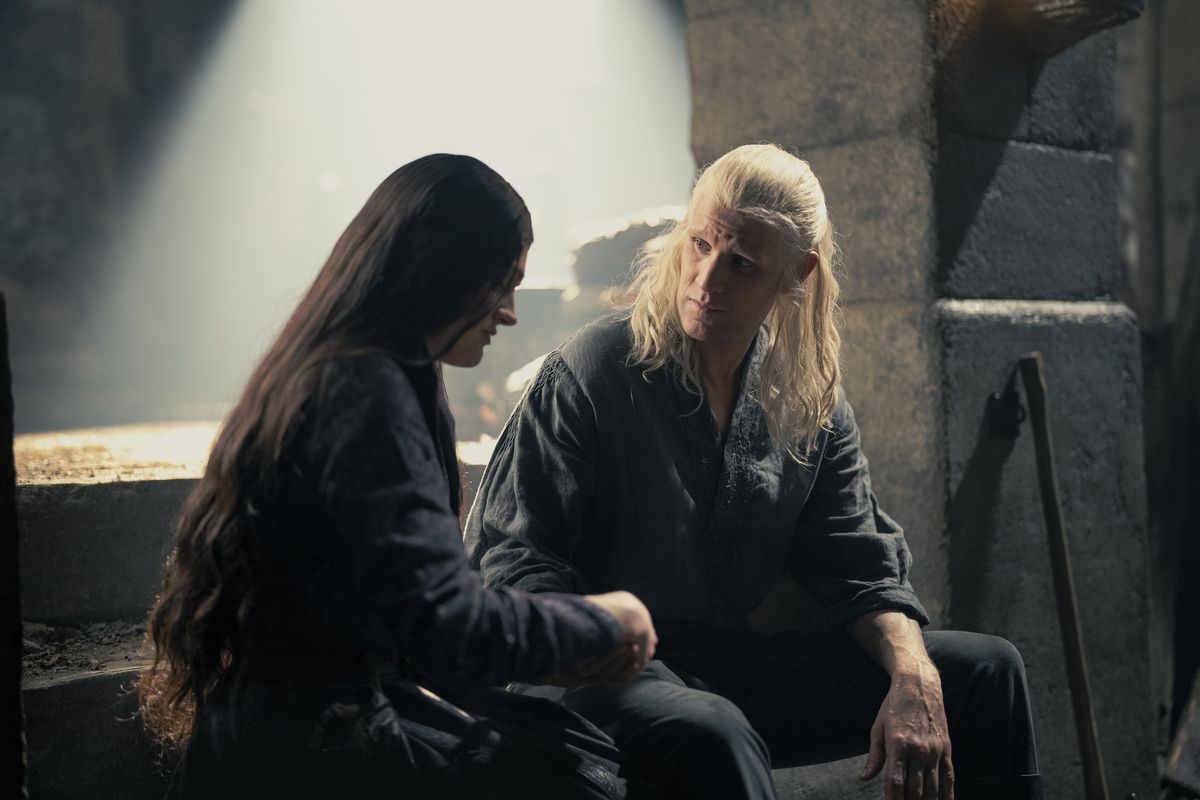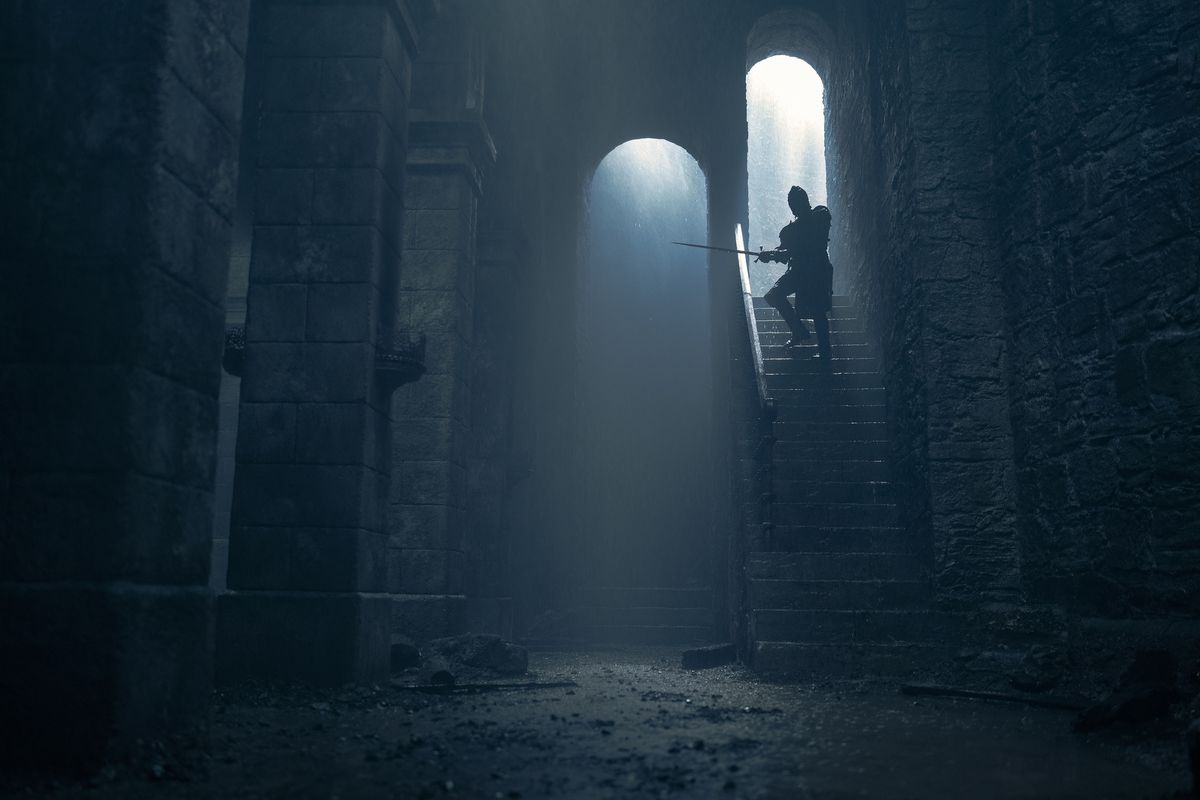Daemon’s nightmares connect him to a much larger Targaryen tradition
As fire burns through the air and the blood of dragons boils the smallfolk hundreds of feet below, Daemon Targaryen (Matt Smith) is being pursued through Harrenhal. The ruined castle was identified as pivotal in the war because of its position in the Riverlands; Rhaenyra’s husband fled there to gain control of it—and escape his wife—and has been followed by a presence manifesting in his mind. He cannot walk the castle’s corridors without visions of the past, and possibly the future. Is Harrenhal haunted, or is Daemon?
After flying into Caraxes and finding no challenge in being there, Daemon has found himself hallucinating. He sees visions of his dead wife serving wine; of a younger Rhaenyra sewing his nephew’s severed head. With the past swirling through his mind, his attempt to escape his pain by distancing himself from Rhaenyra backfires as his guilt follows him to Harrenhal. Considering what Daemon has shown the audience since the beginning of the series, the most surprising thing about his new situation is that he can feel guilt at all. With each passing episode, his nightmare edges closer to reality as his visions worsen.
Game of Thrones introduced the Targaryens’ affinity for magic: Daenerys experienced a prophecy in the Season 2 finale while in the House of the Undying. She sees a vision of herself in the roofless throne room, ash covering the ground like snow. Knowing where that series was going, the only assumption can be made that House of the Dragon‘s visions for Daemon are to be taken seriously. With these nightmares flooding his vision, he might consider working to restore the past before his future is erased.
Photo: Ollie Upton/HBO

Photo: Ollie Upton/HBO
The Targaryen family is no stranger to magic — they ride dragons! As a family that is considered to have a high status, it makes sense that the Targaryens would have a stronger tendency to believe in prophecies and pay more attention to hallucinations (and then probably call them prophecies, as Viserys did with his son in the series pilot). The series finale includes a mention of the Targaryens’ belief that the “dragon blood” that flows through their veins from their ancestors in Old Valyria allows them, exclusively, to ride dragons. By adding another magical element to the series, the creators more closely tie the family to a spiritual existence in Westeros, while providing the series with a path for Daemon’s development while he’s isolated from the other characters. The members of this noble family believe less in traditional spirituality, comparing themselves more to gods than mortal men. The most powerful house in Westeros may have dragons, but there’s certainly no time for introspection!
Yet the Targaryens have woven magic into their history: Game of Thronesand more specifically the book series it is based on, is about Aegon’s Dream, which has caused more trouble than any other story in the history of the realm. In George R. R. Martin’s books, the only people we know who revere the story are the Targaryens themselves, with Rhaegar in particular really falling for the hype, while most of the lesser folk remain apathetic to the supposed fables their fathers tell to princes. While other noble houses share a history with those around them, the House of Fire and Blood keeps to a higher degree than even the other noble houses of Westeros, even marrying within the house so that the bloodline remains purely Old Valyrian (which is why it was such a scandal that Viserys chose to marry Alicent Hightower). The stories told within House Targaryen are treated as concrete facts that only those otherwise within the house will understand. The audience understands that this lore is accepted religiously due to events that (almost) happened in Game of Thrones.
A family so intent on keeping others out only invites the dangers of isolation. The entire family seems to yearn for understanding in different ways, with Daemon specifically seeking to fill the void left by the love and respect Viserys gave Rhaenyra. He missteps after acting quickly in search of validation, the cause of his current marital avoidance being his role in the death of a child. The past creeps up on him, stirring a fear within him he never knew existed. He keeps hearing of ghosts haunting the halls around him, but he knows that the only thing possessing them is him.

Photo: Ollie Upton/HBO
Daemon’s nightmarish stay at Harrenhal brings visions reminiscent of the darkness Daenerys saw in the House of the Undying in Game of Thrones. And Daemon being in another part of the realm gives him time to piece together in his own way everything that has happened since Viserys’ death. The Targaryen line claims to have the blood of the dragon – some of them can’t even be burned (at least not on Game of Thrones) — so a connection to the magic in the world around them offers them a glimpse into the more spiritual side of things, including the experience Daemon has at Harrenhal as the past surrounds him. Westeros isn’t awash in magic, but it seems the Targaryens have a knack for attracting anyone who is there, which is likely why they’re seen as more elevated beings than ordinary humans.
House of the Dragon has focused on Daemon’s inability to see outside of himself, even in dire situations, and how that is a detriment to everyone around him. Avoiding Rhaenyra by fleeing to Harrenhal seems to have given him the isolation he needs to dig deeper into his memories of the cruelty he’s caused, most recently the death of an innocent child. What Daemon sees is perhaps the most terrifying for him, as he is forced to acknowledge truths that no one else will force upon him. Within a family whose existence and connection to dragons can be described as magical, it makes sense to observe someone’s own personal history by personifying what haunts them. It shares characterization with the audience without having to twist the story and have Daemon interact with another person just for the sake of explanation.
As long as Daemon is in Harrenhal, he will feel the choices he makes weighing on him as he hides from his wife. Dragon pushes the Targaryen lore deeper, an intricate look at the effect they have not only on the realm and those around them, but on themselves. Using a kind of vision, the series has Daemon confront his past choices, the burden they’ve left on him, and how they’ve affected his view of himself. The Dance of Dragons has begun, and it’s more than fire-breathing beasts clawing at Daemon Targaryen.
